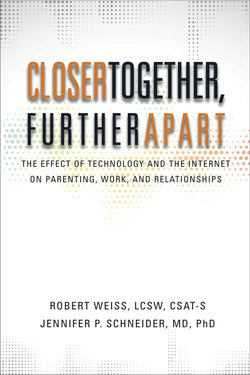Читать книгу Closer Together, Further Apart: The Effect of Technology and the Internet on Parenting, Work, and Relationships - Jennifer Schneider - Страница 19
На сайте Литреса книга снята с продажи.
Technology and Politics
ОглавлениеDo digital natives and digital immigrants differ politically? One school of thought says digital natives are (or will become) more responsible citizens than their predecessors by using their technological expertise to exert social change. With their technological know-how, the theory goes, younger people can communicate more quickly and more expertly than their predecessors. And there are certainly examples that support this, such as the 2008 U.S. presidential election in which digital natives voted for Barack Obama (who campaigned heavily online via Facebook and Twitter) by a two-to-one margin, while digital immigrants were essentially evenly split between Obama and John McCain. Whether Gen Ys voted for Obama because he did a better job of communicating with them or because he better represented their political ideals remains open for debate. More than likely the result was a combination of both factors.
As the Economist stated in 2010:
There is a feeling of superficiality about much online youth activism. Any teenager can choose to join a Facebook group supporting the opposition in Iran or the liberation of Tibet, but such engagement is likely to be shallow. A recent study by the Pew Research Center, an American think-tank, found that Internet users aged 18-24 were the least likely of all age groups to e-mail a public official or make an online political donation. But when it came to using the web to share political news or join political causes on social networks, they were far ahead of everyone else. Rather than genuinely being more politically engaged, they may simply wish to broadcast their activism to their peers. [There] may be less going on here than meets the eye.17
Of course, the same thing could be said about baby boomer activists in the 1960s. Were most boomers attending rallies and sit-ins because they fully understood the causes, or because it seemed like the groovy thing to do? Once again, the answer is likely some combination of the two.
So far, the political split between Gen Y and older generations has not played out with the same visible acrimony as the gap between the boomer generation of the 1960s and 1970s and its predecessors. This, however, may change. After all, many current public policies work to the benefit of older generations at the expense of younger people. In Great Britain, young people have responded to this disparity by forming the Intergenerational Foundation, (www.if.org.uk), an organization created to publicize and redress their many grievances. Their slogan? “Fairness for Future Generations.” These young activists are lobbying online rather than taking to the streets as boomers once did, but they’re nonetheless getting the message out.
In the United States, Generations Y and Z will soon rule the political roost. As Morley Winograd and Michael D. Hais wrote in a 2012 National Journal article, “At 95 million, Millennials [Gen Y] are the largest American generation ever. By 2020 they will comprise more than one in three eligible voters. Sooner or later, those numbers, and the unity of belief that the millennial generation has so far brought to politics, will allow that generation to reshape the United States, first as voters and then as the nation’s leaders. The way in which boomers and seniors react to the growing presence of Millennials, and the younger generation’s distinctive beliefs and experiences, will determine the difficulty of the transition from the old America to the new.”18
